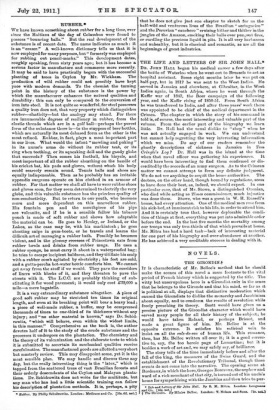RUBBER.
WE have known something about rubber for a long time, ever since the Haitians of the day of Columbus were found to possess "bouncing balls." But the real development of the substance is of recent date. The name indicates as much it is an "eraser." A well-known dictionary tells us that it is now employed for many purposes, but" formerly was employed for rubbing out pencil-marks." This development dates, roughly speaking, from sixty years ago ; but it has became a serious factor in manufacture and commerce more recently. It may be said to have practically begun with the successful planting of trees in Ceylon by Mr. Wickham. The production of wild rubber could not possibly have kept pace with modern demands. To the chemist the turning point in the history of the substance is the power by which the manufacturer enhances the natiiral qualities and durability: this can only be compared to the conversion of iron into steel. It is not quite so wonderful, for steel possesses a quality iron does not, that very property which distinguishes rubber—elasticity—but the analogy may stand. For there are innumerable degrees of resiliency in rubber, from the elastic threads which are in a golf ball—perhaps the purest form of the substance there is—to the stoppers of beer bottles, which are naturally its most debased form as the other is the most refined. Rubber, in fact, plays a most important part in our lives. What would the infant "mewling and puking" in its nurse's arms do without its rubber teat, or its ring when teething, or its squeaking doll and the gaudy globe that succeeds ? Then comes his football, his bicycle, and most important of all the rubber sheathing on the handle of his cricket bat, his pads and gloves, without which his body could scarcely remain sound. Tennis balls and shoes are equally indispensable. Then as he probably has an irritable appendix surgeons operate on him clothed in an armour of rubber. For that matter we shall all have to wear rubber shoes and gloves soon, for they seem determined to electrify the very globe, and this valuable substance has the priceless quality of non-conductivity. But to return to our youth, who becomes more and more dependent on this marvellous rubber. His fountain pen and the mouthpiece of his pipe are vulcanite, and if be is a sensible fellow his tobacco pouch is made of soft rubber and shows how adaptable the material can be. He goes to Henley, or Ireland, or the Lakes, as the case may be, with his mackintosh ; he goes shooting snipe in gum-boots, or he travels and learns the difficult art of managing a rubber bath. Possibly he becomes violent, and in the gloomy recesses of Princetown eats from rubber bowls and drinks from rubber mugs. He uses a rubber sponge, he must carry it about in a waterproofed bag; he tries to escape incipient baldness, and they titillate his scalp with a rubber comb agitated by electricity ; his feet are cold, and a gutta-percha hot-water bottle comforts him. We cannot get away from the stuff if we would. They pave the corridors of liners with blocks of it, and they threaten to pave the streets with it. The L.C.C. are probably thinking of sub- stituting it for wood pavement; it would only cost £30,000 a mile—a mere bagatelle.
It in a very extraordinary substance altogether. A piece of good soft rubber may be stretched ten times its original length, and even at its breaking point will bear a heavy load; a piece of well-made rubber, a buffer, may be compressed that/sands of times to one-third of its thickness without any injury; and "no other material is known," says Dr. Schid. rowits, "which will behave, even within the widest limits, in this manner." Comprehensive as the book is, the anther devotes half of it to the study of the crude substance and the processes it undergoes on the plantation. The chemistry and the theory of its vulcanization and the elaborate tests to which it is submitted to ascertain its mechanical qualities receive careful notice. The manufactured goods are allotted averyshort but masterly review. This may disappoint some, yet it is the most sensible plan. We may handle and discuss these any day, but the really interesting thing is the "latex,' which is tapped from the scattered trees of vast Brazilian forests and their orderly descendants of the Ceylon and Malayan planta- tions. Dr. Sehidrowitz does not write for the multitude, but any man who has had a little scientific training can follow his description of plantation methods. It is, perhaps, a pity • Rubber. By Philip Schidrowitz. London : Methuen and Co. CION. ed, net.] that he does not give jest one chapter to sketch for us the half-wild and ventnrous lives of the Brazilian" seringueiro " and the Peruvian" eaucliero cruising hither and thither in the jungles of the Amazon, smoking their balls over pungent fires, or curdling the precious liquid in pits. It is all very barbarous and unhealthy, but it is classical and romantic, as are all the beginnings of great industries.






































 Previous page
Previous page